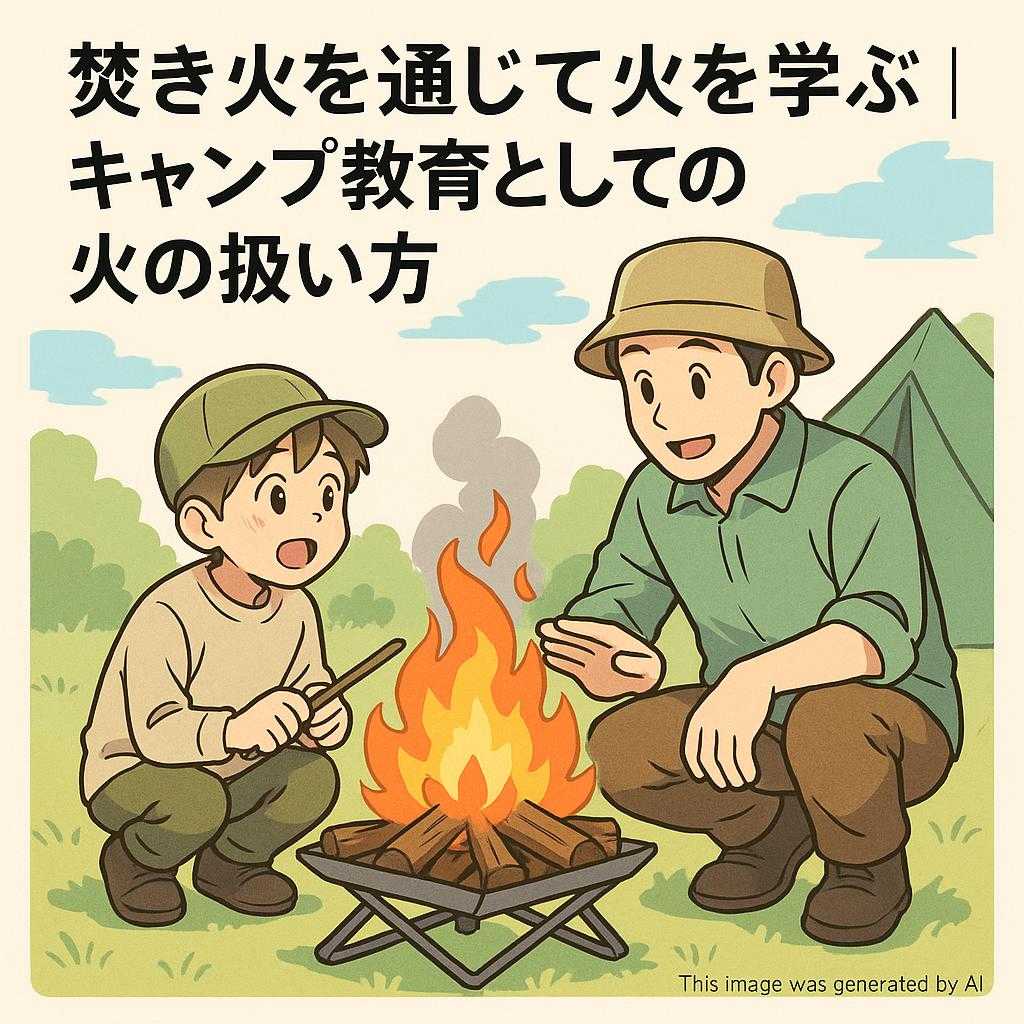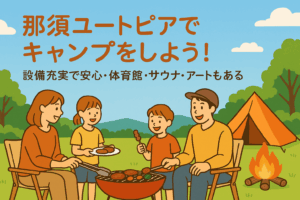
Learning About Fire Through Campfires | How to Handle Fire as a Camping Education
Camping is a wonderful experience that allows you to learn a lot while interacting with nature. Among these experiences, “fire education” is particularly noteworthy. This is part of an educational program where children learn how to handle fire safely and understand its properties through campfires. In modern times, opportunities to directly interact with fire in daily life have decreased. However, understanding the correct use of fire is crucial for developing self-sufficiency during disasters or outdoor activities. Campfires are an excellent opportunity to experience coexistence with nature and develop the ability to secure warmth and food on your own. Additionally, spending time around a campfire with family and friends can be a wonderful moment to deepen bonds. This article will explain in detail the points and precautions for children to safely and enjoyably experience campfires. When you go camping, be sure to enjoy the opportunities for new discoveries and growth with your children through “fire education.”
What is Fire Education?
“Learning About Fire Through Campfires | How to Handle Fire as a Camping Education” is an activity aimed at teaching modern children the skills to safely handle fire in nature. Many children have fewer opportunities to directly interact with fire in their daily lives, and experiencing its importance and appeal through campfires and campfires is essential.
The Importance of Fire Education
Fire education is not just about the technique of starting a fire; it is a valuable educational opportunity to cultivate coexistence with nature and risk management skills. In camping, children can develop the ability to think and act independently in a natural environment, gaining independence and a sense of responsibility in the process. It is also recognized as a skill useful in times of disaster.
Practical Learning Through Campfires
Campfires are not just a pastime; they are filled with learning opportunities. Starting with gathering firewood, choosing the right location, and learning how to start a fire, the entire process deepens understanding and respect for nature. Additionally, cooking over a campfire expands interest in ingredients and offers new taste experiences.
Safe Campfire Methods
To safely enjoy a campfire, there are several key points. First, check the wind direction and surrounding conditions and conduct the activity in a safe location. An adult must always accompany and provide appropriate guidance to the children. Also, preparation for emergencies, such as having water and extinguishing tools ready, is essential. These are all important elements in practicing “Learning About Fire Through Campfires | How to Handle Fire as a Camping Education.”
Coexistence with Nature and Sustainability
The campfire experience in camping is also a good opportunity to think about coexistence with nature. By using firewood and branches as limited resources without waste, it becomes a chance to consider a sustainable lifestyle. Additionally, by being mindful of the impact on the ecosystem, awareness of environmental protection is heightened.
The Relationship Between the Natural Environment and Humans
“Learning About Fire Through Campfires | How to Handle Fire as a Camping Education” is also useful for deeply understanding the relationship between humans and nature. Throughout history, we have received many benefits from nature, with “fire” being one of them. This activity plays an important role in passing on knowledge and skills to new generations while appreciating those benefits.
Skills Useful in Disasters
In times of disaster, lifelines may be cut off. In such cases, using “campfires” for heating and cooking is very effective. The skills cultivated through “Learning About Fire Through Campfires | How to Handle Fire as a Camping Education” can be applied in emergencies. This practical knowledge and experience also lead to increased disaster preparedness awareness.
Emergency Response Ability
In emergencies, quick and calm judgment is required. The experience gained through “campfires” is useful in such situations. For example, the ability to quickly and safely gather fuel and cook while ensuring safety are skills that can be applied in everyday life.
Enjoying Camping Experiences with Family
The “campfire” experience, which the whole family can participate in, is valuable time spent together. By working together as a family, communication deepens, and mutual understanding progresses. Additionally, the joy gained from new challenges and discoveries is shared by the entire family.
Family Communication
At the campsite, you will cooperate in an environment different from everyday life. The teamwork and communication skills gained from this experience are also important at home. During the time spent around the “campfire,” topics that are not usually discussed may come up, and new bonds may be formed.
The simple task of “gathering firewood” starts a series of processes filled with learning and growth. Participants from different backgrounds and purposes will perceive new discoveries and surprises from diverse perspectives. And that may be the most valuable outcome obtained through “gathering firewood.”
The simple task of “gathering firewood” starts a series of processes filled with learning and growth. Participants from different backgrounds and purposes will perceive new discoveries and surprises from diverse perspectives. And that may be the most valuable outcome obtained through “gathering firewood.”
The simple task of “gathering firewood” starts a series of processes filled with learning and growth. Participants from different backgrounds and purposes will perceive new discoveries and surprises from diverse perspectives. And that may be the most valuable outcome obtained through “gathering firewood.”
Q&A About Learning About Fire Through Campfires | How to Handle Fire as a Camping Education
Q1: What can you learn through campfires?
A1: Through campfires, you first learn the basic handling of fire. For example, the selection and dryness of firewood, wind direction, and more are important. You can also acquire the skills to safely start a fire using appropriate tools. These are skills that are useful in times of disaster.
Q2: What are the precautions when allowing children to experience campfires?
A2: When allowing children to experience campfires, it is important to always have an adult present and ensure thorough safety management. Additionally, having water nearby and disposing of ashes as waste are necessary to consider the environment.
Q3: What tools are used for campfires?
A3: Basic tools used for campfires include axes, wedges, matches, and lighters. These are necessary for splitting firewood and starting fires, and mastering their use allows for safer enjoyment of campfires.
Q4: What are the points to consider when having a campfire during camping?
A4: When having a campfire during camping, it is important to check the wind direction and conduct the activity in a safe location. Also, to prevent spreading to the surroundings, use fire-resistant sheets or bricks to protect the environment. Furthermore, since conditions change with weather and humidity, appropriate responses are required each time.
Q5: What are the benefits of the campfire experience?
A5: The benefits of the campfire experience include personal growth and a sense of accomplishment. The joy of success after trial and error is exceptional, and it is the moment when efforts and ingenuity are rewarded. Additionally, dialogue with nature and observational skills are nurtured.
Summary: Campfires are not just a camping activity; they provide lifelong skills and knowledge. From children to adults, there is much to learn while enjoying safely.
Summary
The campfire experience in camping is a valuable opportunity for children to learn while interacting with nature. The knowledge and skills gained through fire education are important for daily life and in times of disaster. This article explained the safe handling of fire through campfires and its educational value. First, fire education is very useful as a place to learn coexistence with nature and to cultivate independence and responsibility. Through the campfire process, understanding of the environment can be deepened. Additionally, family camping experiences promote communication between parents and children and provide opportunities to share new discoveries and joys. These elements combine to make “campfires” an educational activity with meaning beyond mere recreation. In your next camping trip, be sure to incorporate “fire education” and enjoy the opportunities for new learning and growth.
